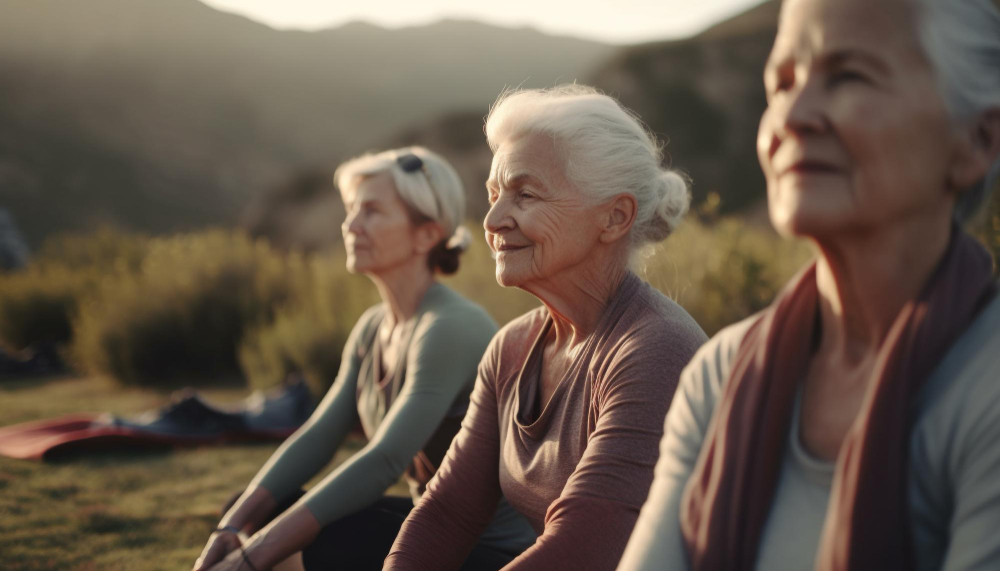

A comprehensive systematic analysis of non-pharmacological therapies for lowering pain and symptoms of depression in adults living with osteoarthritis discovered that combined mind-body methods such as yoga, qigong, and tai chi were the most beneficial.
UNSW Sydney researchers analyzed data from 23 international studies to discover effective non-pharmacological pain and symptom relief options. Based on their findings, they contrasted single and multi-modal treatments and made evidence-based treatment recommendations.
The findings, published in Scientific Reports, show that while resistance/aerobic exercise or therapy alone did not improve depressive symptoms, mind-body approaches improved pain and depression reduction in people with osteoarthritis more than aerobic/resistance exercise or therapy alone.
Osteoarthritis is a chronic disease marked by the increasing degeneration of the protective cartilage that covers the ends of bones in joints. It is connected with an increased risk of various chronic illnesses, as well as decreased physical activity and stiffness, which can worsen pain symptoms and lower quality of life. Depression and anxiety are two typical psychological co-morbidities that arise in conjunction with osteoarthritis and other mental health problems.
Treatment without the use of medicines
Dr Claire Burley, lead author and Postdoctoral Fellow at the UNSW Medicine & Health Lifestyle Clinic and Centre for Healthy Brain Ageing (CHeBA), says effective non-pharmacological interventions are needed to address pain and depression in osteoarthritis, which are well-established risk factors for dementia, the leading cause of death in women and the second leading cause of death in all Australians after heart disease.
“Given the strong correlation between osteoarthritis and dementia and that 40% of dementia cases could be prevented or delayed by targeting risk factors including physical inactivity and associated chronic conditions, our findings show promising non-pharmacological alternatives when mind-body approaches are combined,” says Dr Burley.
Despite extensive research in this field, previous systematic reviews did not identify the most effective approaches to treat pain levels and depression symptoms in osteoarthritis, leading this meta-analysis.
“This is important because there is no cure for arthritis. Medications are often used to reduce pain but fundamentally they mask the symptoms and can have many negative effects on the person,” says Dr Burley.
“Our findings clearly demonstrated that movement meditation practices such as yoga, tai chi, and qigong had a more pronounced impact when compared to standalone aerobic or resistance exercise in reducing both pain and symptoms of depression,” says Dr Burley.
Furthermore, multimodal approaches, such as combining physical exercise with mind-based/education approaches, were found to be more successful than aerobic or resistance training alone, though not as effective as movement meditation methods.
Earlier workout prescription
Exercise and education were also highlighted as critical components of clinical guidelines for osteoarthritis care, with the findings indicating that patients who understand how to self-manage their pain and participate in regular physical exercise have better health outcomes.
“Emphasising the importance of addressing psychological well-being, such as symptoms of depression, alongside physical health concerns like pain, is crucial for delivering high-quality healthcare to people living with osteoarthritis,” says A/Prof. Belinda Parmenter, study co-author and Head of UNSW Medicine & Health Lifestyle Clinic.
For optimal best practice outcomes, the researchers highlight individualized therapies using a collaborative and holistic approach comprising healthcare professionals from multiple disciplines such as nutrition, exercise, and psychology, as well as actively interacting with patients/clients.
“We need to encourage people to take part in mind-body based approaches, rather than taking medications. Educating health professionals on more effective approaches that they can provide for their clients/patients’ needs to be a priority,” says A/Prof. Parmenter.
“These approaches are accessible to everyone, and they can be modified for different populations.”
The relevance of the research
Given the high prevalence rates and co-occurring illnesses, qualitative studies such as focus groups and interviews with people living with osteoarthritis and depression can greatly improve understanding of both conditions and aid in the development of focused treatment options.
“We have just received a small seed grant to run a pilot Healthy Body & Mind Program for people living with cognitive decline and osteoarthritis, so the findings from this research will inform that program,” says Dr Burley.
“We are collaborating with people living with dementia to develop the program and have several students who are also developing interventions for people living with osteoarthritis and other chronic conditions such as diabetes and osteoporosis. Additionally, we are examining the effects of diet on chronic conditions.”
more recommended stories
 Precision Oncology with Personalized Cancer Drug Therapy
Precision Oncology with Personalized Cancer Drug TherapyKey Takeaways UC San Diego’s I-PREDICT.
 Iron Deficiency vs Iron Overload in Parkinson’s Disease
Iron Deficiency vs Iron Overload in Parkinson’s DiseaseKey Takeaways (Quick Summary for HCPs).
 Rising Chagas Parasite Detected in Borderland Kissing Bugs
Rising Chagas Parasite Detected in Borderland Kissing BugsKey Takeaways (At a Glance) Infection.
 Can Ketogenic Diets Help PCOS? Meta-Analysis Insights
Can Ketogenic Diets Help PCOS? Meta-Analysis InsightsKey Takeaways (Quick Summary) A Clinical.
 Ancient HHV-6 Genomes Confirm Iron Age Viral Integration
Ancient HHV-6 Genomes Confirm Iron Age Viral IntegrationKey Takeaways for HCPs Scientists reconstructed.
 Silica Nanomatrix Boosts Dendritic Cell Cancer Therapy
Silica Nanomatrix Boosts Dendritic Cell Cancer TherapyKey Points Summary Researchers developed a.
 Vagus Nerve and Cardiac Aging: New Heart Study
Vagus Nerve and Cardiac Aging: New Heart StudyKey Takeaways for Healthcare Professionals Preserving.
 Cognitive Distraction From Conversation While Driving
Cognitive Distraction From Conversation While DrivingKey Takeaways (Quick Summary) Talking, not.
 Fat-Regulating Enzyme Offers New Target for Obesity
Fat-Regulating Enzyme Offers New Target for ObesityKey Highlights (Quick Summary) Researchers identified.
 Spatial Computing Explains How Brain Organizes Cognition
Spatial Computing Explains How Brain Organizes CognitionKey Takeaways (Quick Summary) MIT researchers.

Leave a Comment